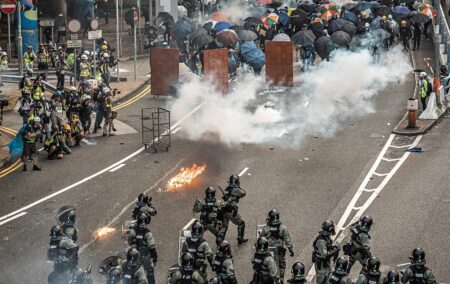Although passed barely a week ago, the Law of the People’s Republic of China on Safeguarding National Security in the Hong Kong Special Administrative Region – which gives Beijing greater control over security matters in Hong Kong – has already been used against dissidents.
The law was passed and signed on 30 June. It criminalises four activities, each of which can carry a lifetime penal sentence: secession, subversion, terrorist activities and collusion with a foreign power.
On 1 July, news reports indicated that 10 people had been arrested under the law. These included a man displaying a flag calling for Hong Kong independence.
Eric Cheung Tat Ming, a legal academic at Hong Kong University, commented: ‘The legal text was filled with China’s socialist legal system’s characteristics and it was vastly different from the legal language and spirit in Hong Kong’s Basic Law.’
Activists for political reform in China used to regard Hong Kong as a relatively safe jurisdiction for their work. The Chinese artist Badiucao (a pseudonym) – who is now an Australian citizen – said that he would not visit Hong Kong owing to the threat of arrest.
According to expert analysts – such as that by Prof Donald Clarke of George Washington University – the law also contains the threat of extra-territorial jurisdiction. The law states: ‘This Law shall apply to offenses under this Law committed against the Hong Kong Special Administrative Region from outside the Region by a person who is not a permanent resident of the Region.’ This could in principle be used to arrest people who are neither citizens nor residents of Hong Kong, but had voiced criticism elsewhere (though presumably their arrest would only be possible if they visited the city).
Some Hong Kongers have opted for a lower profile, by deleting their social media accounts.
Others have vowed to continue their campaigns, and taken to conveying political messages using code words and gestures in place of slogans that would now be illegal. For example, graffiti has appeared in Causeway Bay (a venue for demonstrations) saying: ‘Arise, ye who refuse to be slaves’. These words are lifted from the Chinese national anthem.
Simon Cheng, a former employee of the UK consulate in Hong Kong, now granted asylum in the UK, has mooted the possibility of forming a Hong Kong Parliament in exile.
A number of countries have expressed concern about the new law and have pledged assistance for Hong Kongers, including offers of possible settlement. These include Taiwan, Australia and the United Kingdom. The UK has announced that it will offer a pathway to residence and citizenship to the roughly three million Hong Kongers holding or eligible for British National (Overseas) status, a peculiar arrangement arising from British administration of the territory into the 1990s.
The United Nations Human Rights Commission has also expressed concern about the ‘vague and overly broad’ definitions of offences. ‘This may lead to discriminatory or arbitrary interpretation and enforcement of the law, which could undermine human rights protection,’ a spokesman for the body said.

